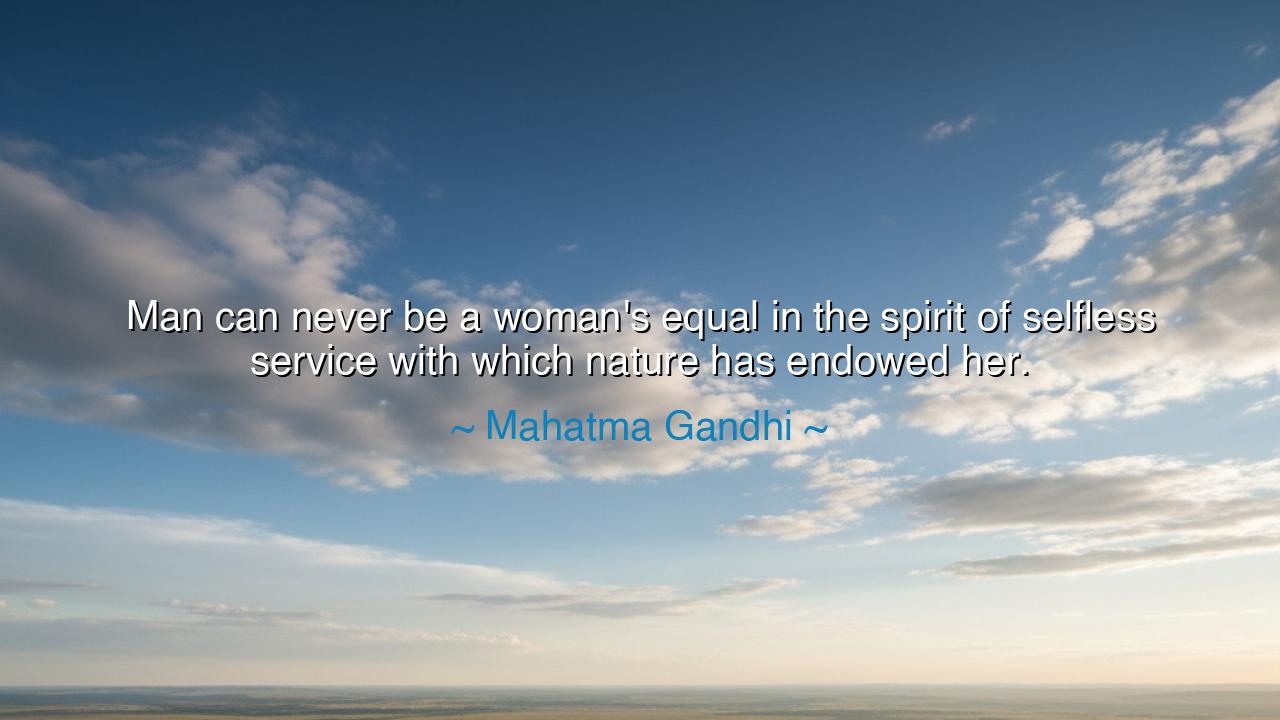
Man can never be a woman's equal in the spirit of selfless
Man can never be a woman's equal in the spirit of selfless service with which nature has endowed her.






"Man can never be a woman’s equal in the spirit of selfless service with which nature has endowed her." So spoke Mahatma Gandhi, the saint of truth and nonviolence, whose words carried the weight of both suffering and hope. In this saying lies not merely praise of womanhood, but the recognition of a deep truth woven into creation itself. For in woman’s heart dwells the spirit of sacrifice, a flame kindled not for herself alone, but for the life of others. Her strength is not the strength of conquest, but the strength of endurance, of nurturing, of silent giving that asks for no reward.
From the earliest dawn of time, when tribes gathered around fire and fields, it was the woman who bent her back so that life might flourish. She bore the pains of birth, not for herself, but that another may breathe. She guarded the weak, soothed the weary, and in countless ways surrendered her own ease for the well-being of those entrusted to her. In her, nature placed the seed of service, a selfless impulse deeper than reason, which man admires but can never wholly imitate. For man, with his striving for glory and recognition, finds it hard to give without desire of return. But woman—she gives because she must; because it is written in her very being.
Consider the tale of Mother Teresa of Calcutta, a frail woman in stature, but a giant in spirit. She did not command armies, nor write laws, nor seek wealth. Instead, she walked among the poorest of the poor, lifting dying bodies from the gutters of the city, cradling them as a mother cradles her child. When asked why she toiled among lepers and the forgotten, she replied simply: “Because they are Jesus in his distressing disguise.” Here lies the embodiment of Gandhi’s words. This selfless service flowed not from the desire of recognition, but from an unshakable call of the heart. Few men could endure such service without faltering, for the weight of ego is heavy; but the woman’s spirit, endowed by nature, bears it with grace.
Yet Gandhi’s words are not meant to diminish man, but to awaken him. He does not say that man is worthless, nor that he cannot serve. He says rather that man cannot equal woman in the purity of service that is innate in her. Man may learn from her, be humbled by her, and walk in her shadow, but he must acknowledge that there is in her a sacred gift beyond his grasp. Just as the sun and moon each shine with their own light, so too man and woman carry different endowments. And in this difference lies harmony, not competition.
The teaching here is one of reverence. To scorn or belittle woman is to scorn the very spirit of service that sustains the world. Let man honor woman, not merely in words but in deeds: by sharing her burdens, by respecting her sacrifices, and by uplifting her voice in the councils of home and nation. For when woman’s gift of service is honored, society flourishes; but when it is despised, society crumbles, for it has severed itself from the roots of compassion.
To the reader who seeks wisdom: do not let these words fall like dead leaves upon the earth. Ask yourself, how may you embody this teaching? Perhaps it is by serving your family without complaint, by lending your strength where another is weary, by listening without demanding praise. Perhaps it is by defending the dignity of women in your workplace, in your community, and in your speech. Do not seek greatness through conquest; seek greatness through selfless service, the true measure of the spirit.
For the lesson of Gandhi’s quote is simple yet profound: that true service is not a bargain but a gift, not a duty but a calling. And though man may not match the selfless instinct of woman, he can learn from her example, shaping his heart to give more freely, more tenderly, more humbly. If each soul, man and woman alike, were to live this truth, then the world would be less a battlefield and more a garden, where sacrifice becomes the soil from which love and peace spring eternal.
Thus let us remember: to serve without expectation is the highest nobility. And in the footsteps of the selfless woman, we too may learn to walk the path of love.






AAdministratorAdministrator
Welcome, honored guests. Please leave a comment, we will respond soon